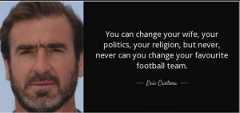Just to continue my polite little dig at the incorrect use of the English language and in particular the media who generally misuse it. The standard of English being screened to which our children are listening is, for want of a better word, diabolical.
The examples I will use are taken from watching Sky Sports and Sky News, but I am sure they are also commonplace on other channels.
Firstly, may I remind anyone old enough to remember and inform anyone not old enough to remember that at one time, to appear on TV, (admittedly there were only 2 channels at the time), one was required to wear a suit and tie and have an Old Etonian accent at least. This was never something I particularly agreed with as there are plenty of people for whom English is an art form, who didn’t attend Eton and who look terrible in a suit.
The problem now is that TV has gone completely the other way. Now a brain isn’t even a requirement.
Anyone who watches Soccer Saturday should be able to testify to that fact. The regulars are interesting characters without having anything interesting to say and my favourite one, since getting this job must have increased his vocabulary to about 50 words. Unfortunately, of the 50 words, he can’t pronounce 20 of them, doesn’t know the meaning of another 20 and forgets 10. There was one who was worse and who only managed to last a season, which by Sky’s very low standards was unbelievable, Jeff.
Generally speaking though, the standard is very low on most sports and news channels.
Examples are, when reporting an injury to a player, “he suffered a bad knee injury!” Implying that he had a bad knee which got injured. “He suffered a serious knee injury!” implying that he has serious knees, or that there are comical injuries, you be the judge.
It is so easy to speak English correctly, is it just laziness that prevents people from doing so or do TV channels deliberately employ people with a problem?
Here’s a very common question, usually from a news anchor to a reporter, “so what do we know about this situation?” This question is probably now the most consistently asked question of many reporters, but the English is awful. Well “WE” obviously know nothing otherwise “WE” wouldn’t have to ask. The question should be, “what can you tell us about the situation?”
We can hardly complain when our children use bad grammar, or can’t speak correctly when the examples put before them can’t string a sentence together or phrase a question correctly. The problem is that these examples ARE watched by the children. They are primetime programs that youngsters adore.
The BBC used to be an example of how to speak. Although over the top, you could never complain at the level of English used. Now, watching children’s TV is scary, as the presenters speech and diction are awful.
We used to think our children’s education was one of the most important aspects of our lives. If we still do we need to help the schools by making sure that TV, Radio and any other form of media set the right example.






























Totally agreed Paul Merson was probably a good footballer but can’t pronounce anything and the program is turning more into a permanent comedy of a very low level .
Certainly Sky could find people that have knowledge of football and can express themselves but they would need to replace the entire panel of Soccer Saturday .
LikeLike
You have the audacity to write an article on “Correct English” and refer to children as “kids!” Kids are young goats!
LikeLike
Good point and the edit has already been made. Kid, however, is an informal noun for child. Here’s what the Oxford English Dictionary says:
noun
1 informal A child or young person:
“she collected the kids from school”
MORE EXAMPLE SENTENCES
SYNONYMS
1.1Used as an informal form of address:
“we’ll be seeing ya, kid!”
So it isn’t bad English to use the term, just informal. I agree that the word children is better in this particular post.
LikeLike
Well thank you for listening and responding, not many people would.
As a former teacher it is a pet hate of mine to hear children being called kids, especially by the younger teachers of today. I understand it’s an informal term but I just don’t find it appropriate.
In the North of England we have a phrase “Here’s looking at you kid!” and “Hang in there kid!” But in these expressions kid actually refers to adults.
LikeLike